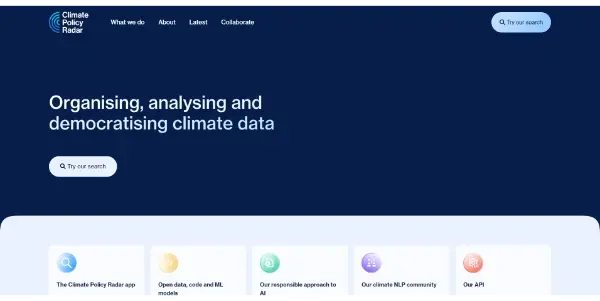Climate Policy Radar

An AI database of global climate laws and policies. Access over 5,000 documents, analyze trends and inform your decisions with advanced search tools and open data
Climate Policy Radar: Navigating the Complex Landscape of Global Climate Legislation
The fight against climate change demands coordinated global action, requiring a deep understanding of the diverse and evolving landscape of climate laws and policies. Navigating this complex terrain is significantly simplified by the Climate Policy Radar, a free, AI-powered database offering unparalleled access to global climate legislation and policy documents.
What Climate Policy Radar Does
Climate Policy Radar acts as a central repository for over 5,000 climate-related laws and policies from across the globe. It goes beyond simple document storage, however, leveraging AI to enable advanced searching, analysis, and trend identification within this extensive dataset. The tool allows users to quickly and efficiently access crucial information to inform their decisions, research, and advocacy efforts.
Main Features and Benefits
- Comprehensive Database: Access a vast collection of climate-related legal and policy documents from numerous jurisdictions worldwide.
- Advanced Search Functionality: Utilize powerful search tools to filter and refine your search based on keywords, location, policy type, date, and other relevant parameters. This ensures you find precisely the information you need, efficiently.
- AI-Powered Analysis: The AI capabilities allow for the identification of trends and patterns in climate policy development globally and within specific regions. This helps users understand the evolving policy landscape and anticipate future developments.
- Open Data: The data is available in an open format, promoting transparency and enabling further analysis and integration with other datasets.
- User-Friendly Interface: The platform boasts an intuitive interface designed for ease of use, regardless of technical expertise.
Use Cases and Applications
Climate Policy Radar offers a wide range of applications for various stakeholders:
- Researchers: Conduct comprehensive research on climate policy trends, comparing approaches across different countries and regions. Identify best practices and inform policy recommendations.
- Policymakers: Access relevant legislation from around the world to inform the development and implementation of effective climate policies. Learn from successful (and unsuccessful) strategies employed elsewhere.
- Businesses: Understand the regulatory landscape and assess the potential impact of climate policies on their operations, enabling proactive adaptation and strategic planning.
- NGOs and Advocacy Groups: Monitor policy developments, track progress towards climate goals, and identify opportunities for advocacy and engagement.
- Journalists and Media: Access accurate and up-to-date information to report on climate policy developments with greater context and clarity.
Comparison to Similar Tools
While several other platforms offer information on climate policy, Climate Policy Radar distinguishes itself through its combination of a comprehensive database, advanced AI-powered search and analysis capabilities, and its open-data approach. Many competing tools might offer a narrower geographical scope, less sophisticated search functionalities, or lack the AI-driven analytical features. The free access point also significantly enhances its accessibility and appeal compared to many subscription-based alternatives.
Pricing Information
Climate Policy Radar is completely free to use. This open-access model ensures that crucial climate policy information is available to everyone, regardless of their resources or affiliation.
In conclusion, Climate Policy Radar represents a significant advancement in the accessibility and usability of global climate policy data. Its unique combination of comprehensive data, advanced AI capabilities, and free access makes it an invaluable resource for researchers, policymakers, businesses, NGOs, and anyone working to address the urgent challenge of climate change.